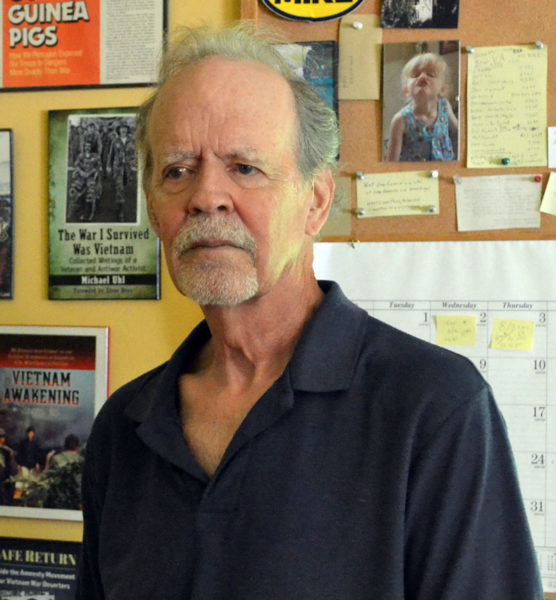
Vietnam War veteran and author Michael Uhl stands in the study of his Walpole home against a backdrop of some of his previous books. Writing on topics from travel to war, Uhl published his most recent book this past May. (Johnathan Riley photo)
Author and Vietnam War veteran Michael Uhl recently published his ninth book, “Safe Return: Inside the Amnesty Movement for Vietnam War Deserters,” a political memoir, with McFarland and Company, Inc.
Uhl’s hope for the book, and part of the reason for writing it now, he said, was to add a perspective of sympathy in history’s discussion of servicemen who deserted their posts during the war. According to Uhl, war deserters and draft evaders are a group of people whom, even in the most liberal settings, have a difficult time justifying their actions to the public.
“It’s an unpopular opinion, but the choice to not fight in an unjust war is a difficult one,” Uhl said. “If (the deserters) had been called upon to defend our own country, there’s no doubt in my mind that they would have.”
Uhl compared the Vietnam War to the current conflict between Ukraine and Russia, citing the mass desertions happening in Russia involving people who don’t want to fight in what they view to be an aggressive and morally corrupt war.
“I hope that when people read the book that they are able to see the case that I’m making in the difference of the types of wars,” Uhl said.
There’s a difference between attaching a soldier’s service to an aggressive war that is unpopular and a war where soldiers are defending their own property and family, according to Uhl.
“Whether they will agree or disagree with me, I don’t know,” he said. “But I think just to make that case, and help the reader understand, is the purpose of this book.”
Uhl served in Vietnam from 1967-1969 as a first lieutenant in the army, specializing in military intelligence, but even during his time of service, he didn’t feel right about the morality of the war and its justification.
“The war didn’t ever sit right with me,” Uhl said.
In 1971, Uhl and business partner Tod Ensign formed the Safe Return Committee in New York City, N.Y. to advocate for amnesty to be given to American military deserters.
Uhl and Ensign kept meticulous records of their correspondence during their time with the committee, most of which is now housed in Cornell University’s archives. Uhl, on several occasions, had to travel from his home in Walpole to access the documents.
“A lot of memoir is based on memory, which can be unreliable,” Uhl said. “While the content of the letters lends themselves to subjectivity, the dates, and the responses, do not.”
Uhl’s writing about war and travel has been featured in The Boston Globe, Geo, House Beautiful, The Nation, Playboy, and Forbes. His latest work, “Safe Return,” was featured on Maine Public Radio in a segment with journalist Irwin Gratz.
“Safe Return” is available for purchase at mcfarlandbooks.com and on Amazon.



